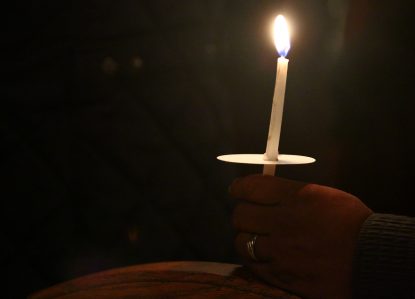
(Photo by Sarah Webb)
Amid the coronavirus pandemic, Holy Week celebrations will take on even greater significance for Christians throughout the world.
“We’re having a true experience of real suffering right now,” said Father Dennis Gill, director of the archdiocesan Office for Divine Worship and rector of the Cathedral Basilica of SS. Peter and Paul.
The virus — which has infected more than 1 million people and killed close to 55,000 worldwide — has deepened the communal dimension of Lent, even as entire nations have been placed on lockdown to prevent the spread of the disease.
[hotblock]
“Lent belongs to the whole church, which hears the invitation to repent and believe in the Gospel,” he said. “We each do our part as a member of the church, to help build it up by this corporate act of penance during Lent.”
(Learn ways you can celebrate at home the solemn days of Holy Week leading up to the joy of Easter.)
Although public liturgies in the Archdiocese of Philadelphia and elsewhere have been suspended until further notice, “the commandment to keep holy the Lord’s day” and the sacred triduum still applies, said Father Gill.
(See the schedule of liturgies for Holy Week celebrated by Archbishop Nelson Perez and livestreamed from the Cathedral Basilica of SS. Peter and Paul.)
Despite the availability of livestreamed Masses, he said, Catholics shouldn’t be afraid to acknowledge their grief at being unable to gather in church and to receive holy Communion.
“It is a heartbreak that you can’t get around,” said Father Gill. “As Catholics, we believe that the Eucharist is the source and center of everything in our lives, and that’s non-negotiable. You can’t replace the in-person celebration of the sacraments, which are encounters with the person of Christ.”
Such “grave loss should create a longing for the Eucharist” and a greater appreciation of contemplation of Christ’s real presence in the bread and wine, he said.
In the meantime, making a spiritual Communion, reading Scripture and reciting the rosary on a daily basis can help sustain believers, he said.
Father Gill suggested that faithful should also consider participating in the Liturgy of the Hours, the daily prayer of the church that clergy and many religious orders recite.
Also known as the Divine Office, the liturgy draws on Scripture passages and hymns to form an ongoing dialogue between Christ and the church throughout each day and evening. The Second Vatican Council encouraged the laity to pray the Divine Office, for which printed and online texts are widely available.
“I would give a special nod to the Liturgy of the Hours at this time, because it is in fact liturgy,” said Father Gill.
Another way of entering more fully into this year’s most unusual Holy Week is to keep the paschal fast, he said.
Often unfamiliar to Catholics, the paschal fast extends from Good Friday until the Easter Vigil in honor of Christ’s passion, enabling the faithful “to share more fully and celebrate more readily his resurrection,” according to the United States Conference of Catholic Bishops.
The paschal fast marks a shift from penance to expectation, and although the coronavirus pandemic may challenge that expectation, the events of Holy Week remind the faithful that Christ’s suffering and death leads to eternal life, Father Gill said.
“Venerate the cross at home, and renew your baptismal promises as you watch livestreamed Mass,” he said. “Know that Jesus Christ is the victor over everything, and he is the victor over this pandemic.”
PREVIOUS: Ministry receives surprise $30K, but still faces challenges during pandemic
NEXT: Watch Palm Sunday Mass with Archbishop Perez



Share this story